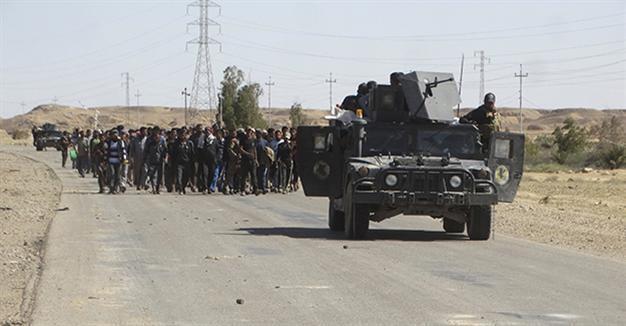ISIL kills dozens in Iraq
BAGHDAD – Reuters

Iraqi security forces escort civilians who fled their homes due to the clashes between Iraqi security forces and Islamic state militants in the town of Hit in Anbar province, April 4, 2016 - REUTERS photo
Explosives planted by the Islamic State of Iraq and the Levant (ISIL) have killed dozens of Iraqi civilians who returned to Ramadi despite warnings that much of the western city remains unsafe nearly four months after its recapture from the militants.
Tens of thousands of displaced residents have returned to the Anbar provincial capital in the past two months, mostly from camps east of the city where they took refuge prior to the army’s advance late last year.
A shortage of experts trained in dismantling the explosives has slowed efforts to restore security, but that has not stopped people from responding to calls from local religious and government leaders to go back home.
The Anbar Governor’s Office, which is overseeing much of the effort to restore Ramadi, declined requests for comment.
But the United Nations said it had learned from the authorities that 49 people have been killed and 79 others wounded in Ramadi since the beginning of February. Those figures are “almost certainly an underestimation,” it said.
“The U.N. is deeply worried about the safety of returning families and the widespread infestation of many neighborhoods with unexploded devices and booby traps,” Lise Grande, U.N. humanitarian coordinator in Iraq, told Reuters. “The responsible thing is to clear these areas as quickly as possible using the most up-to-date, modern and professional methods. Anything else just risks too much.”
De-mining is seen as a critical first step in returning civilians to Ramadi, which a U.N. team said last month suffers from destruction worse than anywhere else in Iraq after months of fighting that saw ISIL bomb attacks and devastating U.S.-led coalition air strikes.
A U.S. de-mining company was contracted last month to remove explosives and train Iraqis to dismantle the devices planted by ISIL in Ramadi, 100 kilometers west of Baghdad.
Sources in Ramadi said another Western company was expected to help with de-mining efforts and Iraqi companies are also now competing for potentially lucrative government contracts.
Still there is just not enough expertise to keep pace with the return of civilians, said Mohamed Ali, a tribal fighter who helps dismantle explosives.
In addition to littering Ramadi’s streets with bombs, ISIL has also planted them in residences, hiding them under rugs and other fixtures or connecting them to the power grid so they detonate when residents attempt to restore electricity.
More than 3.4 million Iraqis across the country have been displaced by violence according to U.N. statistics, most of them from the minority Sunni Arab community.
